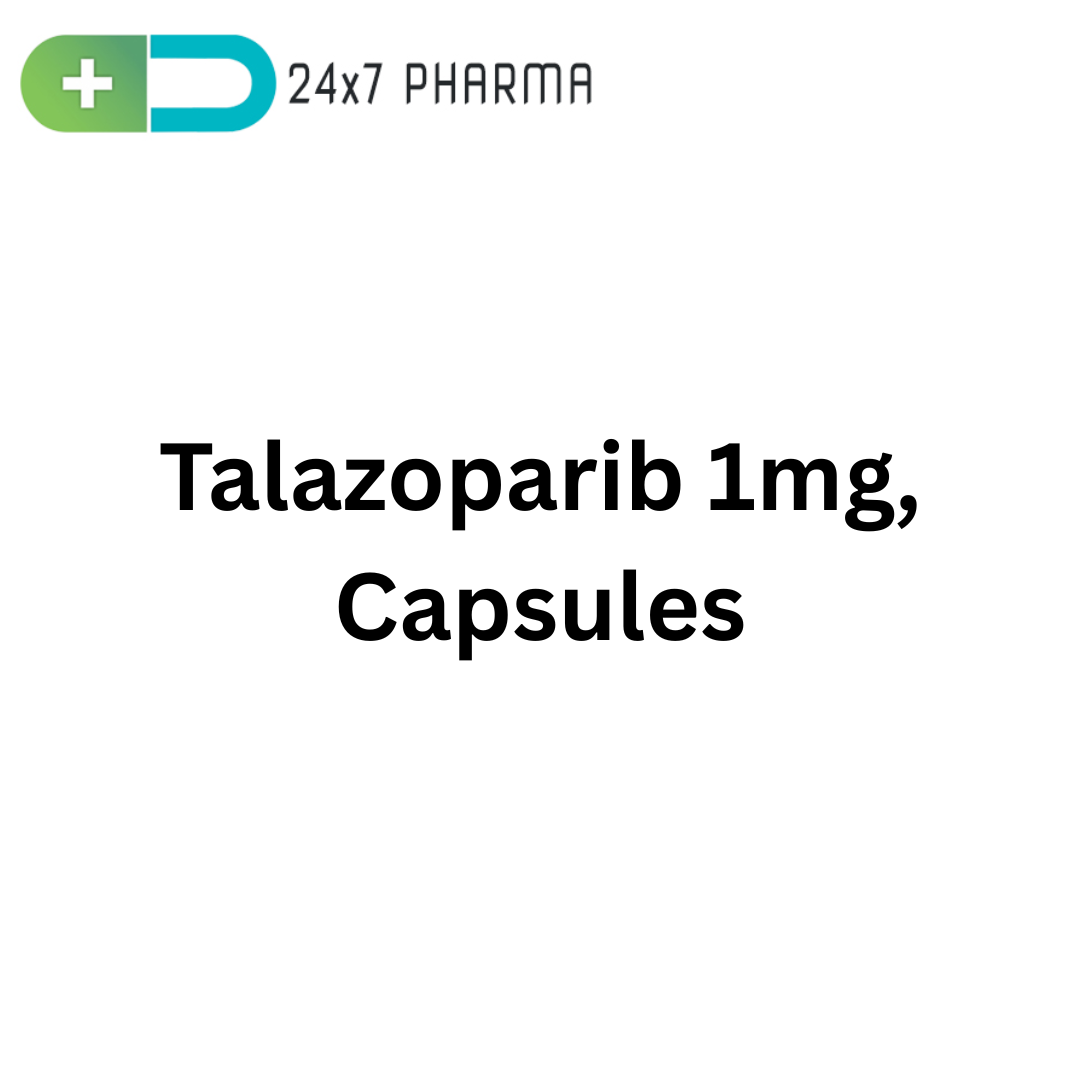Talaparib 1mg, Talazoparib Capsules
Talaparib 1mg, containing the active substance Talazoparib, is an oral targeted cancer therapy belonging to the class of PARP inhibitors (Poly ADP-Ribose Polymerase inhibitors). It is designed for the treatment of certain types of breast and other solid tumors, particularly those associated with mutations in BRCA1/2 genes. By targeting DNA repair pathways, Talaparib exploits the vulnerabilities in cancer cells, helping halt their growth and spread.
What is Talaparib 1mg?
Patients with genetic BRCA mutations who have HER2-negative locally progressed or metastatic breast cancer are the main target of the prescription anticancer drug Talaparib 1mg. It is provided in oral capsule form and typically administered once daily.
It offers a personalized treatment option, often chosen after confirming the presence of specific genetic mutations (BRCA1 or BRCA2) through diagnostic testing.
How It Works / Mechanism of Action
Talaparib works as a PARP inhibitor. PARP enzymes help repair damaged DNA in cells. Cancer cells, especially those with BRCA mutations, rely heavily on the PARP enzyme for survival due to defective DNA repair pathways.
Here’s how Talaparib functions:
- Inhibits PARP enzyme activity, which leads to the accumulation of DNA damage in cancer cells.
- Traps PARP on damaged DNA, which further prevents repair.
- Without proper DNA repair, cancer cells undergo cell death (apoptosis).
- Selectively toxic to BRCA-mutated cells, sparing normal healthy cells to a larger extent.
- This synthetic lethality approach makes Talaparib effective in targeting specific tumor cells while limiting systemic toxicity.
How to Use / Indications
Talaparib 1mg is approved for the treatment of:
- HER2-negative locally advanced or metastatic breast cancer with a germline BRCA1/2 mutation.
- It may also be used off-label in some cases for ovarian, prostate, or pancreatic cancer with BRCA or homologous recombination deficiency (HRD) mutations, based on clinician judgment and ongoing studies.
Before starting treatment:
- Genetic testing is required to confirm BRCA mutation.
- Baseline tests like CBC, liver, and kidney function tests are conducted.
How to Take / Dosage
Standard Dosage:
- The usual dose is 1mg Talazoparib taken once daily, preferably at the same time each day.
- Capsules should be swallowed whole, not chewe or open.
- It can be taken with or without food.
Administration Tips:
- If a dose is miss and it’s less than 8 hours until the next one, skip the miss dose.
- Avoid double dosing.
- Hydration and nutritional support may be advise alongside therapy.
Other Dosage and Adjustments
Dose modifications may be necessary in certain conditions:
- Mild to Moderate Renal Impairment: No initial dose adjustment require.
- Severe Renal Impairment: Dose reduced to 0.75mg once daily.
- Hematologic Toxicity: If blood counts drop significantly (e.g., anemia, neutropenia, thrombocytopenia), the dose may be reduce to 0.75mg or 0.5mg daily, or even held temporarily.
Always follow the oncologist’s dose adjustment plan for safety.
Side Effects
Like all medications, Talaparib may cause side effects. Common and serious effects include:
Common Side Effects:
- Fatigue
- Nausea
- Vomiting
- Anemia
- Headache
- Diarrhea
- Loss of appetite
- Low white blood cell count (neutropenia)
- Low platelet count (thrombocytopenia)
Serious Side Effects:
- Severe myelosuppression (dangerously low blood counts)
- Secondary cancers such as MDS (Myelodysplastic Syndrome) or AML (Acute Myeloid Leukemia) – rare but possible
- Pneumonitis (inflammation of lung tissue)
- Hypersensitivity reactions
Prompt medical attention is needed for:
- Unexplained bruising/bleeding
- Fever or signs of infection
- Shortness of breath
- Severe fatigue or pallor
Storage
- Store Talaparib capsules at room temperature (20°C to 25°C or 68°F to 77°F).
- Keep away from excessive heat, moisture, and direct sunlight.
- Store in the original container and out of reach of children.
- Do not use beyond the expiry date on the packaging.
Benefits
- Targeted therapy: Selectively attacks cancer cells with BRCA mutations.
- Oral administration: No need for hospital-based infusions.
- Personalized treatment: Based on genetic profiling, improving outcomes.
- Improved progression-free survival in clinical trials compared to standard chemotherapy.
- Fewer systemic side effects compared to traditional cytotoxic drugs.
Prescription
Talaparib 1mg is a prescription-only medication:
- Can only be prescribed by qualified oncologists.
- Positive BRCA mutation test findings are the basis for prescription.
- Requires regular monitoring and follow-ups.
Patients are advise to:
- Keep regular blood count monitoring appointments.
- Inform the doctor right away if you have any strange symptoms.
- Use effective contraception during and after therapy (as advised).
Interaction
Talaparib may interact with other medications or substances:
Known Interactions:
- Strong P-gp inhibitors (e.g., amiodarone, verapamil) may increase Talazoparib levels.
- CYP3A4 inducers (e.g., rifampin, phenytoin) may reduce efficacy.
- Anticoagulants or antiplatelets: Risk of bleeding if blood counts drop.
- Due to immunosuppression, live vaccinations should be avoid while undergoing treatment.
Always inform your doctor of:
- All current medications
- Herbal products or supplements
- Any history of allergies or previous drug reactions
FAQs
Can Talaparib cure cancer?
Talaparib is not a cure, but it significantly slows down cancer progression and improves quality of life and survival in certain patients.
Can I stop the tablet if I feel better?
No. Never stop without consulting your doctor, as prostate cancer can progress silently.
Is Talaparib chemotherapy?
No, it is a targeted therapy, not traditional chemotherapy. It works by blocking a specific enzyme (PARP).
Conclusion
Talaparib 1mg (Talazoparib Capsules) represents a major advancement in targeted cancer therapy, particularly for individuals with BRCA-mutated breast cancer. By disrupting cancer cell DNA repair, it offers a precise and potent method of combating tumor progression.
Its oral formulation, targeted mechanism, and promising clinical outcomes make it a vital component in personalized oncology care. However, due to the risks of side effects, interactions, and the need for genetic testing, expert medical supervision is essential throughout therapy.
With ongoing research, Talaparib’s indications may expand to benefit more cancer patients in the future, underlining the importance of precision medicine in cancer treatment.







